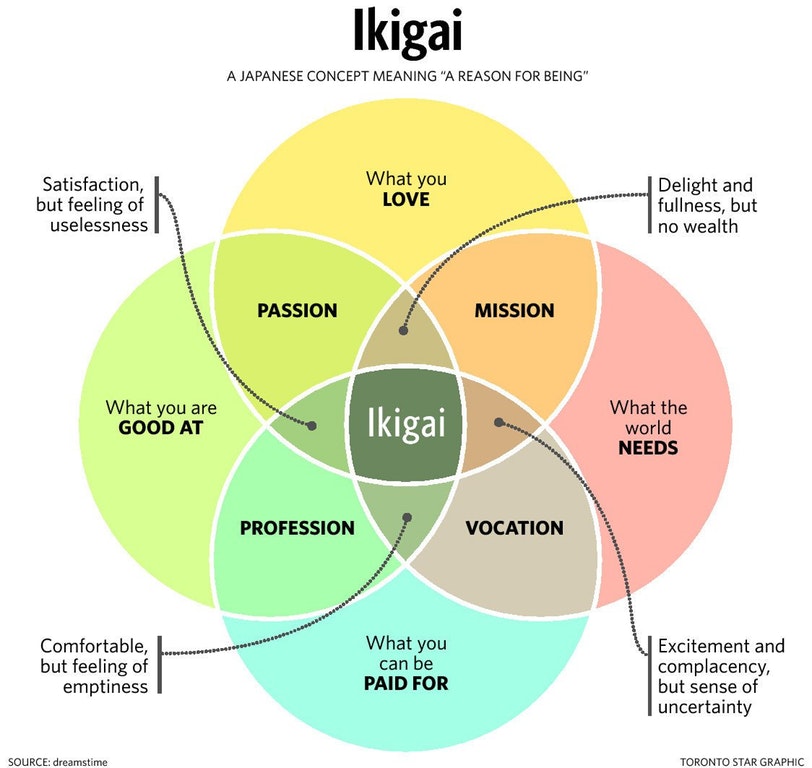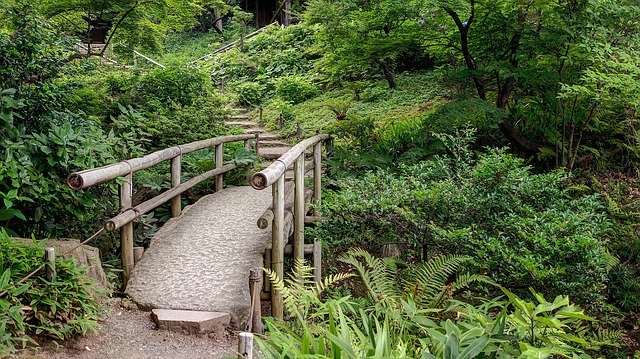What is your reason to get up in the morning?
For many Japanese people the answer is clear: It’s their Ikigai.
Iki-what? On Wikipedia it says:
Ikigai (生き甲斐, pronounced [ikiɡa]) is a Japanese concept that means “a reason for being.” The word “ikigai” is usually used to indicate the source of value in one’s life or the things that make one’s life worthwhile. The word translated to English roughly means “thing that you live for” or “the reason for which you wake up in the morning.”
The concept of Ikigai originates from the culture of Okinawa, a place in Japan that has the greatest number of long-living happy humans. Therefore, it is believed that the benefit of Ikigai is not just happiness, but that it could also contribute to longevity.
Dan Buettner, author of The Blue Zones, 9 Lessons for Living Longer From the People Who’ve Lived the Longest*, breaks down the concept into three lists: your values, things you like to do, and things you are good at. The cross section of the three lists is your Ikigai.
However, the graphic below shows that ikigai can also be seen as the convergence of four primary elements:
- What you love.
- What the world needs (from you).
- What you can get paid for.
- What you are good at.
This leads to the following:
- The intersection of 1 and 2 is your mission.
- 2 and 3 result in your vocation.
- 3 and 4 make your profession.
- The intersection of 4 and 1 is your passion.

How to find your own Ikigai?
Discovering your own Ikigai is said to bring fulfilment, happiness and make you live longer – three pretty good reasons to invest a little time to think about this concept, right?
So ask yourself questions to each of the four components and write down your answers, perhaps even draw a venn diagram like the one above and add your notes in there to visualize it.
What do you love?
What do you really enjoy doing the most? Note the emphasis on doing, even if wasting your time on the couch is your favorite pastime, it defeats the concept at which we are aiming.
So what inspires you, what do you get enthusiastic about? What can you do for hours without getting bored or tired? Maybe you already liked doing it as a child? Do you like talking about something and like to share your passion about it with others?
What does the world need from you?
What’s the difference you would like to make in this world? What can you do to make the world a better place? What would you like to see different in the world? What does it mean to you and/or the ones around you?
Oh and btw, don’t get caught up in the meaning of the word, “world.” It can mean anything from the whole world to the little cosmos around you.
What can you get paid for?

Let’s be honest: finding a job where you can apply not only your talents but also share your passion to make the world a better place and get paid for it, is the most difficult to achieve. So let’s take baby steps here:
Which jobs, positions or even tasks spark your interest? Or take a look at your usual week at work. What are the things you like most about your job? Are there any tasks you like to do best? Can you do something to be involved more in these kind of projects?
What are you good at?
Be it a talent or skill like speaking several languages, playing an instrument, teaching others, speaking in public, coordinating projects or organizing events, you can make it part of your Ikigai. Think about where your strengths lie or maybe there are some hidden talents yet to be discovered?
Whatever it may be you focus on, put in some effort and energy to master your talents, fine tune your skills and grow your purpose.
Your Ikigai is work in progress.
What I really like about the concept of Ikigai is that it touches on personal, professional, and financial fulfillment. At the end, the sweet pot is simply the area where the things you love to do, the things you’re good at, the things that help the world, and the things you get paid for overlap.
You may prefer a holistic approach to finding Ikigai or a more pragmatic one, but whichever way you choose, focus on yourself and identify what you enjoy doing, then you are capable of finding your own.
Also, be practical about it. Defining your Ikigai will not come overnight. Take your time to build a strong foundation from where you can take small steps toward growth.

One thing is for sure: Your Ikigai is work in progress. That means, as we change, our Ikigai changes as well. What once felt right might not feel right two years down the road. So it will be up to you to constantly define your reason, to get up in the morning.



